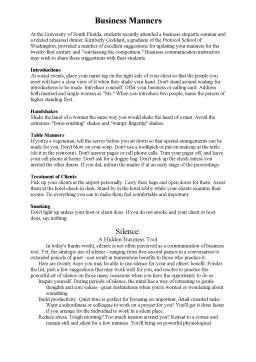Extras din proiect
At the University of South Florida, students recently attended a business etiquette seminar and a related rehearsal dinner. Kimberly Goddard, a graduate of the Protocol School of Washington, provided a number of excellent suggestions for updating your manners for the twenty-first century and "outclassing the competition." Business communication instructors may wish to share these suggestions with their students.
Introductions
At social events, place your name tag on the right side of your chest so that the people you meet will have a clear view of it when they shake your hand. Don't stand around waiting for introductions to be made. Introduce yourself. Offer your business or calling card. Address both married and single women as "Ms." When you introduce two people, name the person of higher standing first.
Handshakes
Shake the hand of a woman the same way you would shake the hand of a man. Avoid the extremes–"bone-crushing" shakes and "wimpy fingertip" shakes.
Table Manners
If you're a vegetarian, tell the server before you sit down so that special arrangements can be made for you. Don't blow on your soup. Don't use a toothpick or put on makeup at the table (do it in the restroom). Don't answer pages or cell phone calls. Turn your pager off, and leave your cell phone at home. Don't ask for a doggie bag. Don't pick up the check unless you invited the other diners. If you did, inform the maitre d' at an early stage of the proceedings.
Treatment of Clients
Pick up your clients at the airport personally. Carry their bags and open doors for them. Assist them at the hotel check-in desk. Stand by in the hotel lobby while your clients examine their rooms. Do everything you can to make them feel comfortable and important.
Smoking
Don't light up unless your host or client does. If you do not smoke and your client or host does, say nothing.
Silence:
A Hidden Business Tool
In today's frantic world, silence is not often perceived as a communication of business tool. Yet, the strategic use of silence - ranging from five-second pauses in a conversation to extended periods of quiet - can result in tremendous benefits to those who practice it.
Here are twenty ways you may be able to use silence for your and others' benefit. Ponder the list, pick a few suggestions that may work well for you, and resolve to practice the powerful art of silence on those many occasions when you have the opportunity to do so.
Inspire yourself. During periods of silence, the mind has a way of retreating to gentle thoughts and core values - great destinations when you're worried or wondering about something.
Build productivity. Quiet time is perfect for focusing on important, detail-oriented tasks. Want a subordinate or colleague to work on a project for you? You'll get it done faster if you arrange for the individual to work in a silent place.
Reduce stress. Tough morning? Too much tension around you? Retreat to a corner and remain still and silent for a few minutes. You'll bring on powerful physiological changes in your body that can help calm you and prepare you for the balance of the day.
Raise your stature. Cultivating the art of graceful silence is one of the characteristics of successful people. Next time you hear a distorted comment, angry retort, or biased question thrown at you, remain silent for a short time. Others will respect you for your thoughtfulness.
Emphasize the seriousness of an action. When it comes time to describe a vital initiative, or to speak with a subordinate or colleague about something she's done wrong, let silence play a part in your comments. After you say what you must say, let your words hang in the air for ten seconds or so. Your listeners won't forget them.
Get your prospect talking. When you're in the midst of a sales call, resist the temptation to present every facet of your product or service. Instead, pause at key junctures, without question or comment…and listen to the often-revealing thoughts of the prospect.
Raise the esteem of others. Many people are afraid to speak up during meetings. When you sense fear on the part of a person near you, ask a general question, something that calls for a thoughtful response…and then wait. Yes, the individual might be uncomfortable at first, but by stepping back and giving him center stage for a few moments, you'll give him the opportunity to build self-confidence.
Analyze your own thinking. Use quiet time to better understand your own reactions to proposals and ideas. And use this all-important time to understand your own motives for thinking the way you do.
Preview document
Conținut arhivă zip
- Business Manners.doc



























